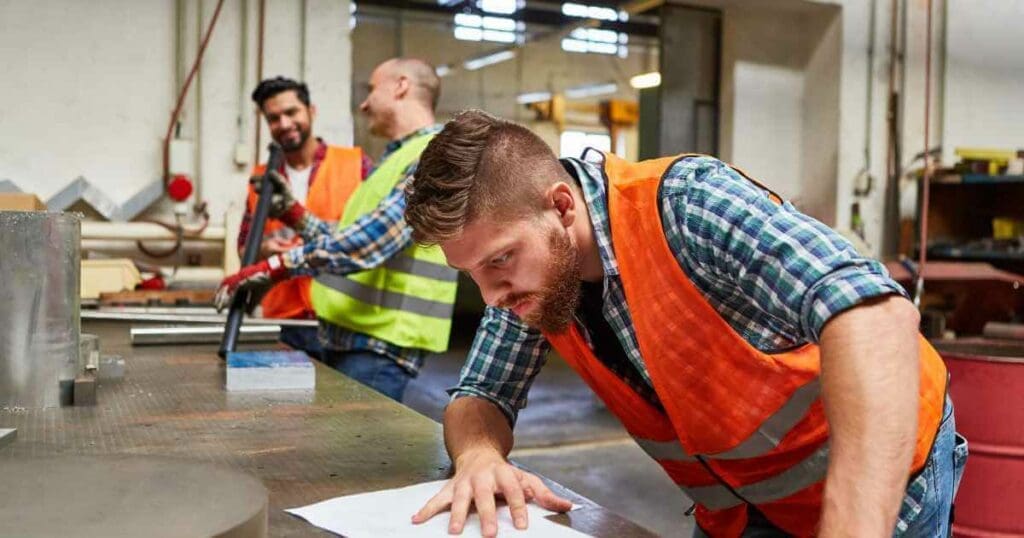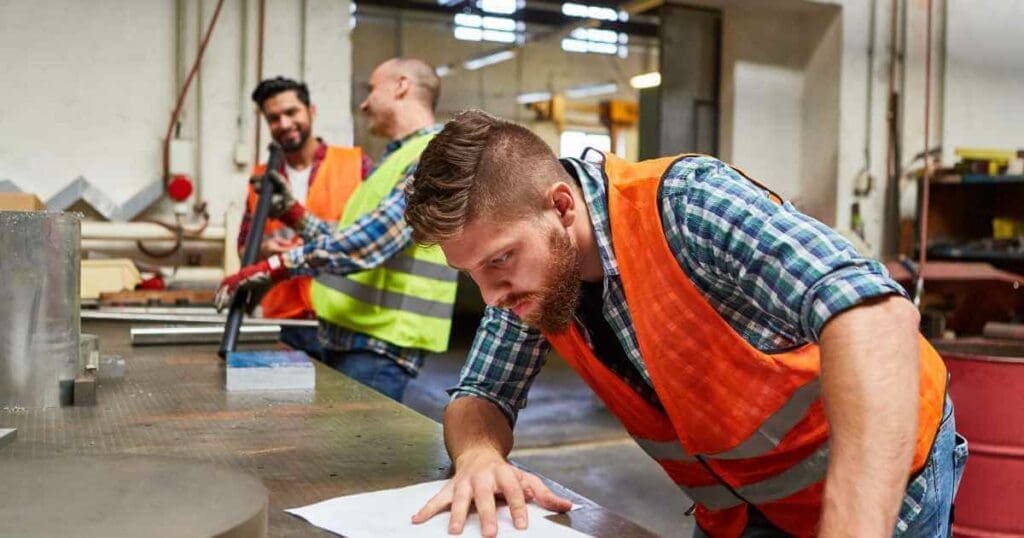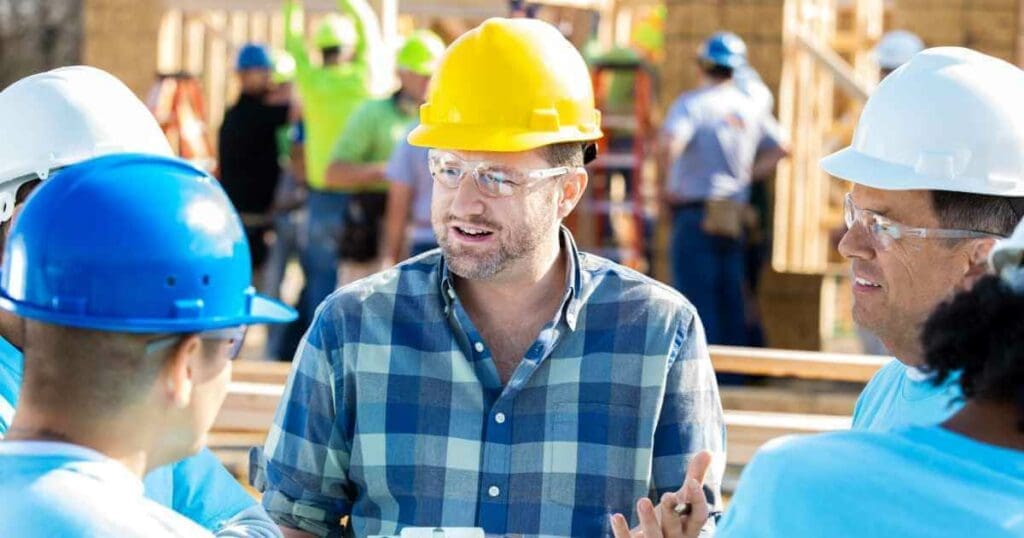What skills does a construction manager need? This question often comes up for those considering this career choice. The construction industry can be challenging and rewarding but can also be intimidating for those unfamiliar with the required skills. However, anyone can become a successful construction manager with the right combination of experience and education.
The top 10 skills that are essential for construction managers include the following:
- Project management
- Problem-solving
- Communication
- Budgeting and finance
- Risk assessment
- Time management
- Leadership
- Technical knowledge
- Health and safety regulations
- Adaptability
At MatchBuilt, we are an executive search firm that connects construction job seekers with leading construction companies. We have helped thousands of job seekers in the construction industry and worked with hundreds of construction companies. Our expertise and industry knowledge can help readers understand the skills necessary to be a successful construction manager.
In the rest of this blog, we’ll delve deeper into each of these skills and explain why they are critical to the success of a construction manager. Whether you’re a seasoned veteran or just starting out in the construction industry, this blog will help you understand the skills you need to succeed.
10 Must-Have Skills for Every Construction Manager
1. Project Management
Project management is a crucial skill for construction managers to be successful. The construction industry is fast-paced and ever-changing, and construction managers must be able to oversee and coordinate multiple projects simultaneously.
Why Project Management is Important:
- Ensures the successful completion of projects on time and within budget
- Enables effective leadership and communication with the team and stakeholders
- Makes informed decisions that drive the project forward
Getting Good at Project Management:
- Take courses and certifications related to project management (PMP, CAPM)
- Seek opportunities for hands-on experience (leading smaller projects, working as a project coordinator)
Measuring Project Management Skills:
- Metrics such as project completion rate, budget adherence, and customer satisfaction
- Regularly review and assess the performance of the project manager and team
Project management is a critical skill for construction managers to succeed. It requires education, experience, and continuous improvement to master and can be measured using metrics such as project completion rate, budget adherence, and customer satisfaction. Whether you’re just starting out in construction or have been in the industry for years, continuously improving your project management skills is essential for long-term success.
2. Problem-solving
Problem-solving is a vital skill for construction managers to have. In construction, many challenges arise, and a construction manager must be able to quickly assess the situation and develop solutions to keep the project moving forward.
Why Problem-solving is Important:
- Addresses and resolves challenges in a timely manner
- Maintains project momentum and prevents delays
- Improves overall project efficiency
Getting Good at Problem-solving:
- Encourages creative thinking and out-of-the-box solutions
- Regularly assesses and learns from past experiences
- Develops strong relationships with team members and stakeholders
Measuring Problem-solving Skills:
- Assess the time and resources required to resolve problems
- Monitor project progress to ensure problems are addressed efficiently
- Track the number of problems that arise and the solutions implemented
Problem-solving is a crucial skill for construction managers to have. It requires creative thinking, continuous learning, and strong relationships with team members and stakeholders. Measuring problem-solving skills can help construction managers assess the efficiency of their problem-solving approach and continuously improve their skills.
3. Communication
Communication is a critical skill for construction managers to have. Construction is a team sport, and construction managers must have excellent communication skills to lead their teams and manage stakeholders effectively.
Why Communication is Important:
- Facilitates clear and effective communication with team members and stakeholders
- Improves project efficiency and reduces misunderstandings
- Builds trust and strengthens relationships
Getting Good at Communication:
- Regularly communicate with team members and stakeholders
- Practice active listening and empathy
- Seek feedback and continuously improve communication skills
Measuring Communication Skills:
- Assess the level of team member and stakeholder satisfaction
- Monitor project progress to ensure effective communication is being maintained
- Track the number of misunderstandings and how they were resolved
Communication is a critical skill for construction workers to have. It requires regular communication, active listening, and continuous improvement to master. Measuring communication skills can help construction managers assess their effectiveness and improve where necessary to lead their teams and manage stakeholders more effectively.
4. Budgeting and Finance
Budgeting and finance are key skills for construction workers to have. In construction, staying within budget is essential to the project’s success, and a construction manager must have a strong understanding of budgeting and finance to ensure projects are completed on time and within budget.
Why Budgeting and Finance are Important:
- Ensures the project stays within budget
- Helps make informed decisions that drive the project forward
- Improves overall project efficiency
Getting Good at Budgeting and Finance:
- Take courses and certifications related to budgeting and finance
- Seek opportunities for hands-on experience (managing smaller budgets, working with financial advisors)
- Stay up to date with industry trends and best practices
Measuring Budgeting and Finance Skills:
- Metrics such as project budget adherence, return on investment and cost savings
- Regularly review and assess the performance of the project manager and team
Budgeting and finance are essential aspects of construction management. These skills require a combination of education, experience, and ongoing development to master and can be evaluated using metrics such as project budget adherence, return on investment, and cost savings. Regardless of whether you are new to the construction industry or have years of experience, continuously improving your budgeting and finance skills is crucial for achieving long-term success.
5. Risk Assessment
Risk Assessment is an essential skill for construction managers to have. In construction, managing risk is critical to the project’s success, and a construction manager must be able to assess risk effectively to minimize the impact of potential problems.
Why Risk Assessment is Important:
- It helps identify potential risks and potential impacts
- Improves decision-making and reduces negative outcomes
- Improves overall project efficiency
Getting Good at Risk Assessment:
- Seek training and education on risk assessment and management
- Gather data and analytics to improve decision-making
- Encourage team members to identify and report risks
Measuring Risk Assessment Skills:
- Metrics such as the number of risks identified and mitigated
- Regularly assess and review the performance of the project manager and team
- Track the impact of risks on the project timeline and budget
Risk assessment is a critical skill for construction workers to have. It requires education, experience, and continuous improvement to master and can be measured using metrics such as the number of risks identified and mitigated, the performance of the project manager and team, and the impact of risks on the project timeline and budget. Improving your risk assessment skills ensures your projects’ success and protects your stakeholders’ interests.
6. Time Management
Time Management is a crucial skill for construction managers to have. Construction projects are often time-sensitive, and a construction manager must be able to effectively manage their time and the time of their team to ensure projects are completed on time.
Why Time Management is Important:
- Ensures projects are completed on time
- Improves overall project efficiency
- Reduces the risk of project delays and increases customer satisfaction
Getting Good at Time Management:
- Establish a clear project schedule and timeline
- Prioritize tasks and delegate effectively
- Use tools and technologies to manage time more effectively
Measuring Time Management Skills:
- Metrics such as project completion time, resource utilization, and team member productivity
- Regularly assess and review the performance of the project manager and team
- Track progress against the project timeline
Time Management is a critical skill for construction workers to have. It requires clear planning, effective prioritization, and continuous improvement to master and can be measured using metrics such as project completion time, resource utilization, and team member productivity. Improving your time management skills ensures your projects’ success and meets stakeholders’ expectations.
7. Leadership
Leadership is a vital skill for construction managers to have. Construction managers are responsible for leading a team of professionals and ensuring everyone works together towards the same goal. Strong leaders can inspire their team, improve morale, and drive project success.
Why Leadership is Important:
- Inspires and motivates the team
- Improves team morale and collaboration
- Increases project efficiency and effectiveness
Getting Good at Leadership:
- Seek training and education in leadership and management
- Develop good communication and interpersonal skills
- Lead by example and set a positive tone for the team
Measuring Leadership Skills:
- Metrics such as team morale, employee satisfaction, and team performance
- Regularly assess and review the performance of the project manager and team
- Track progress against project goals and objectives
Leadership is an essential skill for construction managers to possess. It takes a combination of education, hands-on experience, and ongoing development to master and can be assessed using metrics such as team morale, employee satisfaction, and team performance. Whether you’re a new player in the construction industry or have years of experience, investing in your leadership skills is crucial to achieving long-term success and ensuring the success of your projects.
8. Technical Knowledge
Technical Knowledge is a vital skill for construction managers to have. Construction workers must understand construction techniques, materials, and regulations to make informed decisions and effectively manage construction projects.
Why Technical Knowledge is Important:
- Helps make informed decisions about construction techniques and materials
- Ensures projects are completed to code and regulations
- Improves overall project efficiency and effectiveness
Getting Good at Technical Knowledge:
- Seek education and training in construction techniques and materials
- Stay up-to-date on industry regulations and standards
- Network with other construction professionals and industry experts
Measuring Technical Knowledge:
- Metrics such as project quality, code compliance, and resource utilization
- Regularly assess and review the performance of the project manager and team
- Seek feedback from industry experts and stakeholders
Technical Knowledge is a crucial skill for construction workers to have. It requires education, training, and ongoing development to master and can be measured using metrics such as project quality, code compliance, and resource utilization. Whether you’re just starting out in construction or have been in the industry for years, continuously improving your technical knowledge is essential for ensuring your projects’ success and meeting your stakeholders’ expectations.
9. Health and Safety Regulations
Health and Safety are critical skills for construction managers to have. Construction managers are responsible for ensuring that all workers and visitors on site are safe and protected from potential hazards.
Why Health and Safety are Important:
- Protects workers, visitors, and the public from potential hazards
- Increases project efficiency and productivity by reducing accidents and downtime
- Improves the company’s reputation and reduces the risk of legal liability
Getting Good at Health and Safety:
- Seek training and education in health and safety regulations and best practices
- Stay up-to-date on industry standards and regulations
- Conduct regular safety inspections and drills to identify and mitigate potential hazards
Measuring Health and Safety:
- Metrics such as accident frequency near misses, and lost time due to accidents
- Regularly assess and review the performance of the project manager and team
- Implement safety audits and seek feedback from stakeholders
Health and Safety is a critical aspect of construction management and requires education, training, and ongoing development to master. It can be evaluated using metrics such as accident frequency, near misses, and lost time due to accidents. Continuously improving your health and safety skills is crucial for ensuring the safety of workers, visitors, and the public, as well as for maintaining your company’s reputation and reducing the risk of legal liability.
10. Adaptability
Adaptability is a key skill for construction workers to have. Construction projects are constantly evolving and changing, and construction managers must be able to adapt to these changes and find solutions quickly.
Why Adaptability is Important:
- Helps respond effectively to changing project conditions and requirements
- Improves project efficiency by reducing downtime and delays
- Increases the ability to find creative solutions to complex problems
Getting Good at Adaptability:
- Seek training and education in problem-solving and decision-making
- Embrace new technologies and tools to improve processes and outcomes
- Remain open-minded and willing to change approaches when necessary
Measuring Adaptability:
- Metrics such as project timeline adherence, completion rate, and stakeholder satisfaction
- Regularly assess and review the performance of the project manager and team
- Seek feedback from stakeholders and team members on their ability to adapt to changes
Adaptability is a crucial skill for construction workers to have. It requires education, training, and ongoing development to master and can be evaluated using metrics such as project timeline adherence, completion rate, and stakeholder satisfaction. Whether you’re just starting out in construction or have been in the industry for years, continuously improving your adaptability skills is essential for ensuring the success of your projects and meeting the expectations of your stakeholders.
Answering Common Questions About Construction Worker Skills
If you’re considering a career in construction or are simply curious about the skills necessary for this field, this FAQ will provide you with a comprehensive overview of the essential skills that every construction worker should possess. From physical strength to technical know-how, read on to discover the key skills needed to excel in the construction industry.
The role of a construction worker is to perform physical labor tasks and assist in the building process under the direction of a construction manager.
Construction workers need skills in physical dexterity, attention to detail, time management, teamwork, adaptability, and following safety protocols.
Construction workers face challenges such as physically demanding work, working in inclement weather, following safety protocols, and adapting to changing job requirements.
The best way to improve construction worker skills is through continuous education and training, on-the-job experience, and seeking feedback from supervisors and team members.
Construction workers can measure their success through job completion rate, safety records, team performance, and supervisor feedback.
To become a construction worker, one needs a combination of education, training, on-the-job experience, and a passion for physical labor and construction.
Career progression opportunities for construction workers include advancement to construction supervisor, project manager, and construction management positions.
Education and certifications needed to progress in a construction career include a high school diploma, trade school education, certifications in specific trade skills, and the completion of safety training programs.
What Skills Does a Construction Worker Need for Career Success
The construction industry offers a wide range of career opportunities for those who possess essential skills. From project management to technical knowledge, each skill plays an important role in achieving success in construction. With proper education, experience, and continuous improvement, you can hone your skills and take your career to the next level.
At MatchBuilt, we understand the importance of these skills and have helped thousands of construction job seekers achieve career success. Whether you’re just starting out or looking to make a career change, our team of experts can help you navigate the job market and find the right opportunities.
Check out our site’s other areas for more information on interviewing, resumes, and career development. Whether you’re a construction worker, manager, or just exploring the industry, MatchBuilt is here to help you achieve your career goals.





